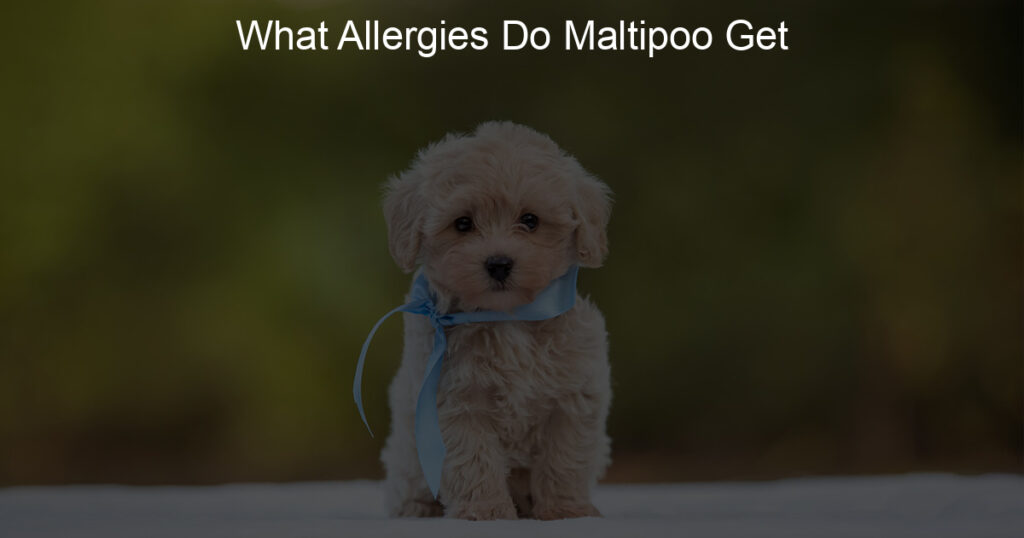It’s no secret that Maltipoos are one of the most popular dogs around! These designer pooches, a mix between a Maltese and a toy poodle, make amazing pets. However, since they are hybrids, it can be difficult to pinpoint what allergies they may have or where those allergies might come from in their genetic background.
Can Maltipoos get food allergies?
Maltipoos, a cross between a Maltese and a poodle, may be prone to food allergies just like other dogs. The signs and symptoms of food allergies in Maltipoos are similar to those of other dog breeds: itchy skin or ears, hot spots on the skin, gastrointestinal issues such as diarrhea or vomiting, and/or sensitivity to typical irritants like dust mites or pollen.
It’s important to look out for these signs if you suspect that your Maltipoo is having an allergic reaction to something they ate. If you believe your pup has a food allergy, take them to the vet right away.
Your vet may recommend an elimination diet that eliminates certain foods from their diet until the allergen is identified. With the right diagnosis and dietary changes, your beloved pup can be living its best life again!
Is Maltipoos prone to skin allergies?
Maltipoos, a loving and friendly crossbreed of the Maltese and miniature poodle, are often chosen for their hypoallergenic coat. However, these little fluff balls may be prone to skin allergies due to their sensitive genetics.
Even though they won’t trigger sneezing and itching attacks like other breeds with fur or dander, Maltipoos can have allergic reactions to fleabites or food sensitivities – much like any other breed.
The good news is that with proper diet and flea preventatives, you can help decrease the chances of your pup suffering from skin allergies. Additionally, regular vet check-ups will ensure your pooch remains happy and healthy throughout its life.
What are the symptoms of Maltipoo allergies?
Maltipoos are cute and popular hybrid dogs, but they can also cause unintended harm to some owners. Many people suffer from allergies when exposed to Maltipoos due to their long coats of fur that trap allergens like dander, dust, mold, and pollen.
Common allergy symptoms include itchy eyes, sneezing and coughing fits, nasal congestion, dermatitis, rashes, and asthma attacks. If you experience any of these after being around a Maltipoo for a prolonged period, it’s important to get checked by an allergist for a proper diagnosis.
Taking steps towards prevention – such as bathing your dog frequently and vacuuming regularly or purchasing air purifiers – can help reduce exposure to potential allergens.
Can Maltipoos have seasonal allergies?
Many pet owners are quickly learning that their pets, just like humans, can suffer from seasonal allergies. This is particularly true for breeds such as Maltipoos, a cross between Maltese and Poodles; both of these breeds are highly susceptible to allergies.
This means that if you’ve got a Maltipoo, it may be worth looking out for the potential signs associated with seasonal allergies. These can include redness, swelling, and itchiness around their eyes and ears. If you suspect your pet is struggling with an allergy, be sure to check in with your vet who can help get to the root of what might be causing the issue.
While there’s no cure for seasonal allergies in pets, much like humans’ nutrition changes, medications, and lifestyle modifications can help keep your little pup feeling happy and comfortable during those warmer months!
Is Maltipoos allergic to dust or pollen?
Maltipoos may be prone to allergies, but luckily dust and pollen aren’t usually the source of their discomfort. Unlike some other dog breeds, they generally don’t react adversely to common airborne particles like dust and pollen.
Because of this, they tend to make great pets for pet owners who have allergies themselves. That being said, it’s still important that all pet owners give their furry friend regular check-ups and the proper nutrition he or she needs to maintain good health. Being aware of your pet’s sensitivities is the best way to keep them feeling happy and healthy!
How can you treat Maltipoo allergies?
Treating allergies in Maltipoos can feel daunting at first, but with the proper measures in place, it can be incredibly manageable. If your pup is suffering from environmental allergies that cause sneezing, itching, redness, or irritation, make sure to keep the coat clean and groomed regularly.
This removes any dust or pollen that may be lodged in their fur. Additionally, speak with your vet about utilizing a hypoallergenic shampoo that further alleviates symptoms. If food allergies are the culprit, paying attention to what ingredients you feed your pup and potentially switching them to an all-natural pet food option or specialized diet may help manage their reactions.
Ultimately, no matter what type of allergy your pet might have, seeking professional advice from a veterinarian is always recommended and will ensure they live a healthy, comfortable life.
In short, Maltipoos might be prone to allergies just like any other breed. However, with proper care and attention and the right diagnosis from your vet, you can help keep your pup happy and healthy no matter what the season!
Remember that if you have any concerns or questions about your pup’s health, it’s best to speak with a professional veterinarian for advice on how to best manage their allergies. Taking care of our animal companions is important as they provide us with so much love and joy – let’s make sure we give them only the same in return!
Conclusion
Allergies can be a difficult thing to deal with, but understanding what your Maltipoo is prone to can help you prevent and address any symptoms that may arise. It’s important to pay close attention to the signs your pup gives you, whether they’re verbal or visual; if something seems off, it’s best to get them examined right away! While allergies are not fun, especially for Maltipoos due to their sensitive nature, there are many steps owners can take to reduce unpleasant symptoms and keep their pets healthy.








